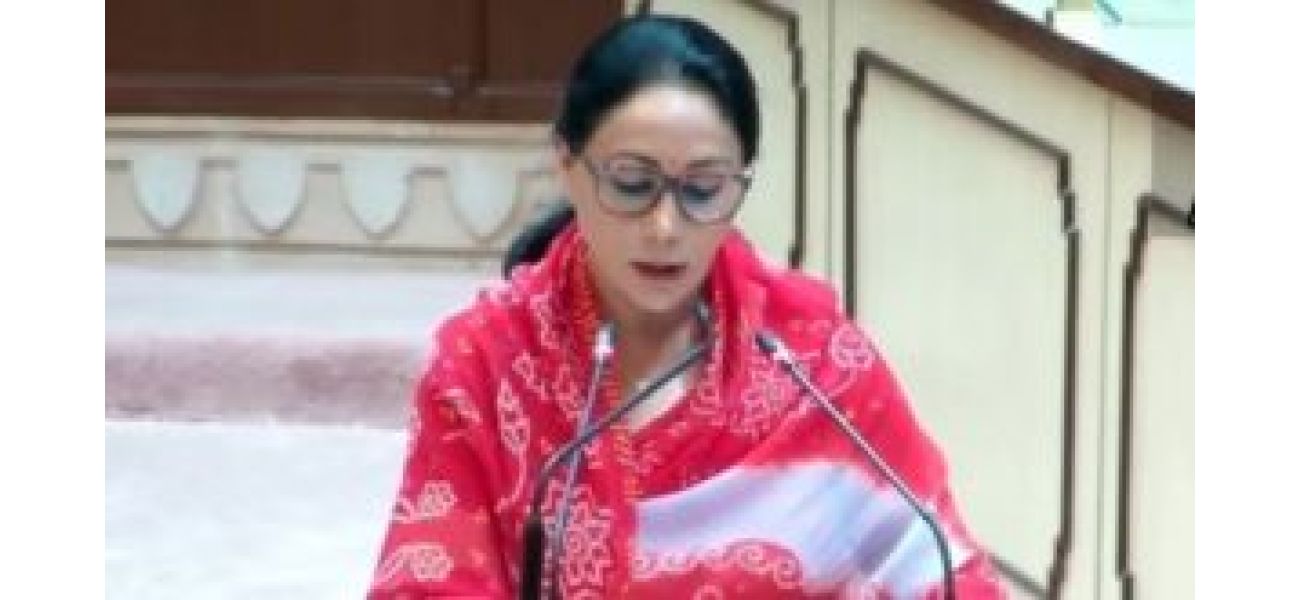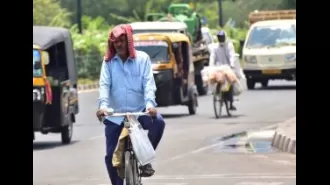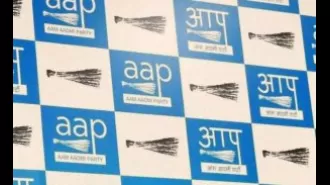The government of Rajasthan aims to create 2.75 lakh new jobs through their first "green budget."
Jaipur: The second budget of the Bhajan Lal government, presented by Deputy CM Diya Kumari, is focused on climate change, employment, and infrastructure development, making it the first 'green budget.'
February 19th 2025.

In Jaipur, the Deputy Chief Minister of Rajasthan, Diya Kumari, presented the second full budget of the Bhajan Lal government. This budget was unique as it was the first 'green budget' with a special emphasis on climate change adaptation, forests, environment, and biodiversity. Kumari, who also holds the position of Finance Minister, stated that the government's main priorities were youth employment, environmental sustainability, and infrastructure development. The main goal of this budget was to establish Rajasthan as a major contributor to India's economic and green growth.
During her speech that lasted 138 minutes, Kumari outlined Rajasthan's ambition to become a $350 billion economy by 2030. She also mentioned that the budget projected estimated revenue receipts of Rs 2,94,536.49 crore for 2025-26, with estimated revenue expenditure of Rs 3,25,545 crore. She further explained that the revenue deficit was calculated at Rs 31,009.41 crore, and the fiscal deficit at Rs 84,643 crore, which is equivalent to 4.25 per cent of the Gross State Domestic Product.
Kumari emphasized the government's focus on employment and employment growth, announcing the recruitment of 1.25 lakh government jobs and 1.5 lakh jobs in the private sector in the coming year. She also announced the Rajasthan Employment Policy 2025, with a specific focus on youth employment. Additionally, she revealed that there would be tax and property reforms, including a 0.5 per cent stamp duty discount on properties worth up to Rs 50 lakh when jointly purchased with a wife.
The Finance Minister also announced plans for the development of a New Aero City near Kota Airport and the improvement of 29 airstrips in the state. In terms of infrastructure and transportation, Rs 250 crore was allocated for Jaipur's traffic system improvement and the removal of BRTS in the city. She also declared the addition of 500 new buses for Rajasthan Roadways under the GCC Model and Rs 12,000 crore for the extension of metro services from Sitapura Industrial Area to Ambawadi and Vidyadhar Nagar.
Furthermore, Kumari mentioned the allocation of over Rs 5,000 crore for state highways, bypass roads, flyovers, ROBs/RUBs, and Rs 60,000 crore for the development of 9 GreenField Expressways. The Finance Minister also unveiled several ambitious projects for energy and environment, including providing 150 free electricity units per month to households with solar plants, community solar plants for low-income families, and a Green Aravalli Development Project with an allocated budget of Rs 250 crore.
To boost the energy sector, Kumari announced the additional production of 6,400 MW in 2025-26, 50,000 new agriculture connections, and five lakh domestic connections. Water availability was also a key focus during her speech, with plans for new water connections in 20 lakh households. The Finance Minister also announced the establishment of the Rajasthan Mineral Exploration Company for mineral exploration and the Center of Excellence for Mines and Minerals in Jaipur.
In terms of education and skill development, Kumari announced the establishment of a new Sainik School in Mirjewala, Sri Ganganagar, and new Sainik Schools for girls in Alwar, Bikaner, Jaipur, Jaisalmer, and Kota. Additionally, 1,500 Atal Tinkering Labs will be introduced in schools, along with the launch of the 'Solar Didi' initiative, inspired by the successful Lakhpati Didi and Drone Didi programs.
The Finance Minister also revealed plans for a Tribal tourist circuit, a new toy park in Kota, stone parks in Nimbahera and Bundi, and a ceramic park. In addition, she announced 18 new industrial areas in the state budget. In the wake of increasing cybercrime, the budget also included the announcement of the Sardar Patel Centre for Cyber Control and a war-room with a budget of Rs 350 crore.
In a move to provide relief to the common man, the budget extended the existing stamp duty rebate, which previously only applied to certain family members, to include daughter-in-law and daughter's children. It also included a 0.5 per cent reduction on stamp duty for properties worth up to Rs 50 lakh jointly purchased by a husband and wife.
Overall, this budget prioritized the well-being of the people, with a focus on youth employment, environmental sustainability, and large-scale infrastructure development. It aimed to position Rajasthan as a key contributor to India's economic and green growth.
During her speech that lasted 138 minutes, Kumari outlined Rajasthan's ambition to become a $350 billion economy by 2030. She also mentioned that the budget projected estimated revenue receipts of Rs 2,94,536.49 crore for 2025-26, with estimated revenue expenditure of Rs 3,25,545 crore. She further explained that the revenue deficit was calculated at Rs 31,009.41 crore, and the fiscal deficit at Rs 84,643 crore, which is equivalent to 4.25 per cent of the Gross State Domestic Product.
Kumari emphasized the government's focus on employment and employment growth, announcing the recruitment of 1.25 lakh government jobs and 1.5 lakh jobs in the private sector in the coming year. She also announced the Rajasthan Employment Policy 2025, with a specific focus on youth employment. Additionally, she revealed that there would be tax and property reforms, including a 0.5 per cent stamp duty discount on properties worth up to Rs 50 lakh when jointly purchased with a wife.
The Finance Minister also announced plans for the development of a New Aero City near Kota Airport and the improvement of 29 airstrips in the state. In terms of infrastructure and transportation, Rs 250 crore was allocated for Jaipur's traffic system improvement and the removal of BRTS in the city. She also declared the addition of 500 new buses for Rajasthan Roadways under the GCC Model and Rs 12,000 crore for the extension of metro services from Sitapura Industrial Area to Ambawadi and Vidyadhar Nagar.
Furthermore, Kumari mentioned the allocation of over Rs 5,000 crore for state highways, bypass roads, flyovers, ROBs/RUBs, and Rs 60,000 crore for the development of 9 GreenField Expressways. The Finance Minister also unveiled several ambitious projects for energy and environment, including providing 150 free electricity units per month to households with solar plants, community solar plants for low-income families, and a Green Aravalli Development Project with an allocated budget of Rs 250 crore.
To boost the energy sector, Kumari announced the additional production of 6,400 MW in 2025-26, 50,000 new agriculture connections, and five lakh domestic connections. Water availability was also a key focus during her speech, with plans for new water connections in 20 lakh households. The Finance Minister also announced the establishment of the Rajasthan Mineral Exploration Company for mineral exploration and the Center of Excellence for Mines and Minerals in Jaipur.
In terms of education and skill development, Kumari announced the establishment of a new Sainik School in Mirjewala, Sri Ganganagar, and new Sainik Schools for girls in Alwar, Bikaner, Jaipur, Jaisalmer, and Kota. Additionally, 1,500 Atal Tinkering Labs will be introduced in schools, along with the launch of the 'Solar Didi' initiative, inspired by the successful Lakhpati Didi and Drone Didi programs.
The Finance Minister also revealed plans for a Tribal tourist circuit, a new toy park in Kota, stone parks in Nimbahera and Bundi, and a ceramic park. In addition, she announced 18 new industrial areas in the state budget. In the wake of increasing cybercrime, the budget also included the announcement of the Sardar Patel Centre for Cyber Control and a war-room with a budget of Rs 350 crore.
In a move to provide relief to the common man, the budget extended the existing stamp duty rebate, which previously only applied to certain family members, to include daughter-in-law and daughter's children. It also included a 0.5 per cent reduction on stamp duty for properties worth up to Rs 50 lakh jointly purchased by a husband and wife.
Overall, this budget prioritized the well-being of the people, with a focus on youth employment, environmental sustainability, and large-scale infrastructure development. It aimed to position Rajasthan as a key contributor to India's economic and green growth.
[This article has been trending online recently and has been generated with AI. Your feed is customized.]
[Generative AI is experimental.]
0
0
Submit Comment





